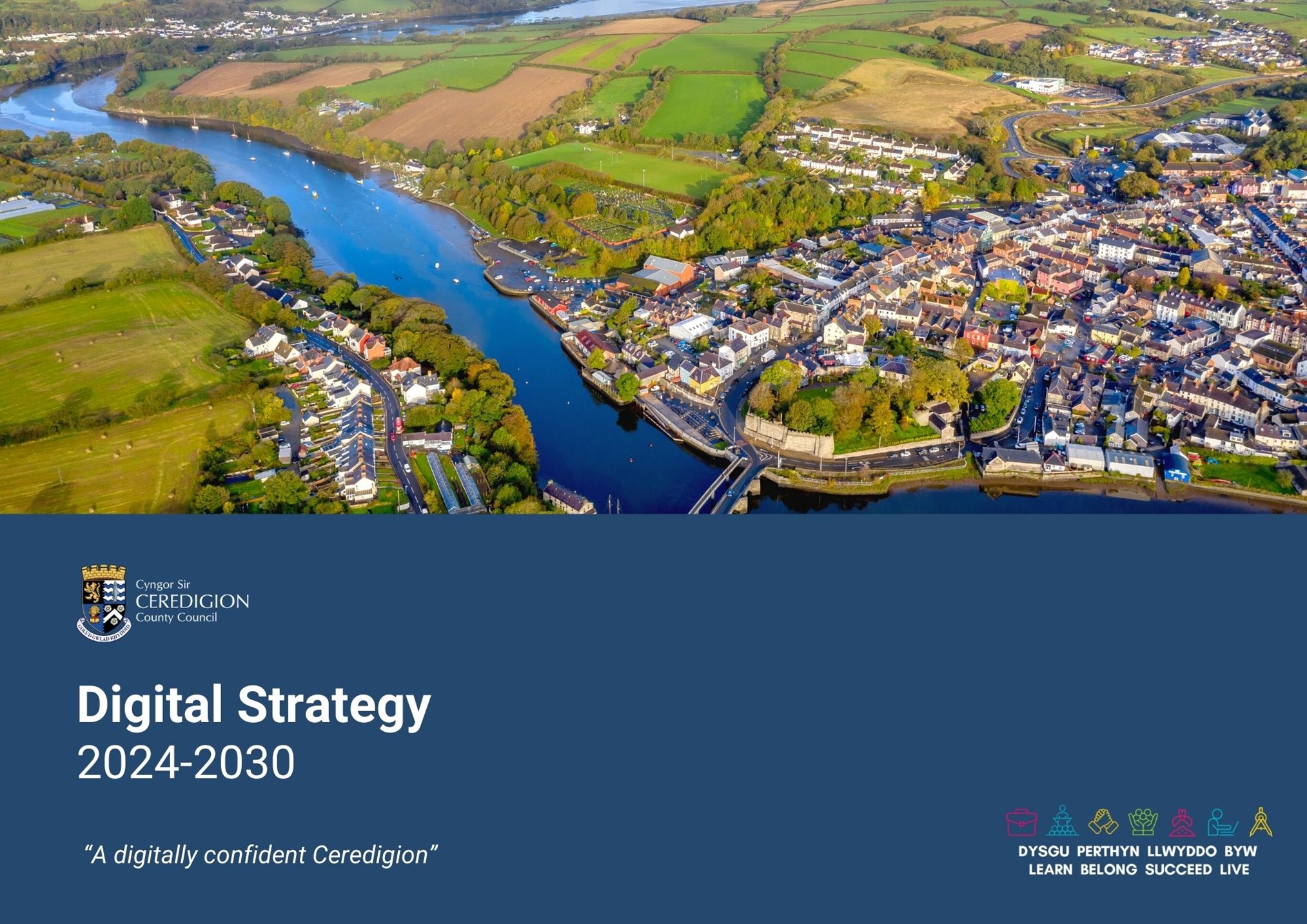
Digital Strategy 2024-2030

Corporate Lead Officer, Customer Contact, ICT & Digital
Published 22/05/2025
Contents
- Foreword
- The National Agenda and External Drivers
- “A Digitally Confident Ceredigion”
- Strategy Construction
- Our Strategic Pillars
- We Deliver Services
- Digital Organisation
- Digital Resident
- Digital Community
- Proposed governance and delivery
Foreword
Mae Ceredigion bob amser yn darparu gwasanaethau gydag ethos gynhwysol. Mae’r strategaeth newydd hon yn canolbwyntio ar gyflwyno datblygiad digidol cynaliadwy, hirdymor ar draws yr holl wasanaethau. Bydd yn annog arweinyddiaeth ddigidol ac yn galluogi’r cyngor i barhau i ddarparu gwasanaethau rhagorol i bobl Ceredigion.
Ceredigion consistently provides services with an inclusive ethos. This new strategy focuses on delivering sustainable, long-term digital development across all services. It will encourage digital leadership and enable the council to continue to provide excellent services to the people of Ceredigion.
Councillor Catrin M S Davies, Ceredigion County Council Cabinet Member responsible for Customer Contact, ICT and Digital
The National Agenda and External Drivers
This strategy has been developed with a wide range of external and internal influences. We have carried out analysis of our strengths and weaknesses, external reviews and investigated our maturity in data and digital technology. We have considered national and local strategies and polled the opinions and advice of partner organisations.
We have learnt from the guidance and discovery work from organisations such as the society for innovation, technology and modernisation (SOCITM), Welsh Local Government Association (WLGA), Government Digital Service (GDS) and the Centre for Digital Public Service (CDPS) amongst others, but we must also accept the difficult financial challenges and limited resources available to deliver change.
We will seek formal feedback though public consultation to help ensure we are considering the whole community needs.
The Growing Mid Wales Board's vision for Mid Wales is to become:
An enterprising and distinctive region delivering economic growth driven by innovation, skills, connectivity, and more productive jobs supporting prosperous and bilingual communities.
Key driving policies which have influenced this strategy include:
- Ceredigion Council Strategy 2022-2027
- Welsh Digital Strategy and the 6 Missions
- digital services
- digital inclusion
- digital skills
- digital economy
- digital connectivity
- data and collaboration
- Wellbeing and Future Generations
- The Government Digital Service (GDS)
- TEC Strategy
- Hywel Dda Digital Strategy
“A Digitally Confident Ceredigion”
Our vision sees a county which is confident to develop, innovate and deliver digital services in partnership with our communities, who are connected, engaged and ready to benefit from them.
Our strategy is designed to deliver this vision statement, to support the national digital missions and to support Ceredigion to deliver on our 4 corporate objectives:
- Boosting the economy, supporting businesses, and enabling employment
- Creating caring and healthy communities
- Providing the best start in life and enabling learning at all ages
- Creating sustainable, green, and well-connected communities
Our vision will see digital technologies embedded across all services and strategies to ensure we can provide innovative and efficient services for all. We will deliver the following aims:
- Develop a digitally skilled, confident workforce with the capacity to adapt and innovate
- Support the community to be digitally confident, comfortable using digital technology to access services
- Support delivery of digital connectivity improvements for the whole county
- Provide the council and its partners with sustainable, resilient, and secure ICT services
- Support the development and delivery of a socially prescribed model which creates caring and innovative communities
- Support and deliver Technology Enabled Care (TEC) solutions which promote independence
- Develop digital leadership skills across the workforce
- Provide our staff with the tools and systems needed to work efficiently and effectively
- Deliver digitally mature services which reduce bureaucracy, improve efficiency to deliver real financial benefits
- Provide digital solutions which support the delivery of Net Zero
- Work to ensure security and resilience underpins all we do
- Make better use of information to support decisions and become a data-driven organisation
- Provide citizens with 24/7 access to services via a My Account and online services
Strategy Construction
To offer long term strategy in the Information Technology and digital field is a difficult challenge. To take advantage of technological change and the new opportunities it presents, we need to be flexible and ready to embrace that change.
Our strategy must consider our future needs, meet the sustainable development principles and the five ways of working embedded within the future generations act but also be flexible to adjust to changing technology.
Our strategy is rooted in principles and plans that will be reviewed at least twice a year. The review sessions will reflect on achievements so far and adjust plans to ensure the strategy is delivered. It is vital that we embed review processes to ensure the organisation can adjust to embrace new trends and technologies as they come to market.
For this strategy, we are considering a long-term view of 6 years but will underpin this with the first 2 years of plans to support delivery of the aims.
STRATEGY 2024 -2030

2 year plans with review and reporting
Our Strategic Pillars
We have broken our strategy into 3 core pillars, outlining priority areas to support.
Digital Organisation
- Our organisation will embrace digital. We will confidently develop, use and support digital projects. We will work with stakeholders to seek continous improvement and delivery of sustainable, secure and efficient processes and systems.
Digital Residents
- Our citizens should be connected to modern, simple and efficient digital services which they feel confident to use. Citizens with special requirements or without the access or skills should not be excluded.
Digital Communities
- Our services will support and enhance smart digital communities to support and benefit all ages to be resilient and independent. Our systems should provide quality information to support citezen-focused services.
We Deliver Services
A service is something that helps someone do something.
As a council, most of our work is delivering services to citizens. We must ensure these services develop with the needs of the community and take advantage of the technology of the time. Continual service improvement is essential if we are to take advantage of digital technologies to improve performance and deliver more efficient services to citizens. Improving the digital confidence of staff is essential so that they can improve process design and efficiency within their own teams.
When developing digital services and solutions, we will ensure they are designed around these principles:

Services are designed to be sustainable, secure, and resilient.

Services are designed with the citizens and stakeholders that use them.

Services develop in an agile and iterative manner to continually improve.

Services provide updates and progress to the user.

Services are designed to be easy to find simple to use.

Services are managed, with defined aims, a lifecycle and measures of success.

Services collect feedback from users and we learn from this.
Digital Organisation
How does Ceredigion become a more confident digital organisation? An organisation able to lead and deliver digital projects and better support the citizens and communities of Ceredigion and Mid Wales.
Through research and engagement with stakeholders, we have identified the following strategic outcomes which must be delivered:
Staff Development and Structure
We need trained and digitally skilled staff to design and maintain digital services.
Strategy Outcomes
- Staff have confidence in their skills and use of technology
- Increased number of dedicated digital roles to support project delivery and ensure projects are managed effectively
- Increase capacity of digital staff to ensure new technology can be embraced and to support the development and skills of the wider workforce
- Breakdown siloed services and encourage collaboration in ‘Team Ceredigion’
- Services are designed around the user and take cognisance of their feedback
How do we measure progress?
- Digital confidence survey
- Digital staff training events attended
- Feedback from events
- Digital training course feedback
- Digital maturity of services
- Digital skills audit
Information Communication Technology (ICT) Foundations
Maintain and develop ICT foundations to support digital delivery
Strategy Outcomes
- Technology systems and services will be monitored to ensure they can meet user demands
- Computer hardware has a managed refresh programme to ensure all staff have the right tools to do the job
- Systems are fit for purpose to allow staff to work digitally with efficiency
- Opportunities to converge technologies are sought to reduce duplication and streamline our technology estate
- Information and records are stored and managed securely and in line with information governance regulations
- Vulnerability management is proactive with software vulnerabilities managed and patched in line with industry standards
- ICT services are resilient, reliable and have capacity to support a productive workforce
- Servers and infrastructure are maintained, and the cloud is utilised pragmatically
- Data and information retention is improved within systems to better support records management
- Long term digital preservation needs are considered and developed
- ICT supports the digital agenda with clear roadmap of developments
- Artificial Intelligence (AI) tools are made available to staff to support their work
How do we measure progress?
- Service desk calls
- Secure Score
- Exposure score
- User survey results
Data Driven Organisation
Our organisation will develop a data driven culture. Data will drive decision making, strategy and improve performance and satisfaction.
Strategy Outcomes
- The processing and sharing of personal information will always be ethical, in line with processing notices, data processing impact assessments (DPIA’s) and follow strict data processing governance to ensure the public can be confident in how we handle and secure their data
- Performance metrics are carefully set to drive performance and improvement
- Leadership sets expectations that decisions are anchored by data
- Data dashboard and analysis can be developed quickly and meet service needs
- Data silos have been broken down to ensure data across the organisation can be used
- Key identifiers link most major systems so that core data can be trusted and data quality improved
- Data quality is managed and there are accurate records of data processing leading to improved data governance
- Our workforce has Microsoft Power Bi skills and can utilise dashboards for all key business areas
- AI supports the analysis and presentation of data
- Data specialists can access defined, trusted data sets to support rapid development
- Where possible information and statistics should be published for wider reuse, especially where this can reduce Freedom of Information (FOI) burden
- Data pipelines (automation) are created to maintain clear, timely and accurate core data sets for accurate analysis
- Procurement of new systems support open standards. Systems support secure API standards, hold key identifiers which will improve collaborative working and sharing of data
How do we measure progress?
- A data dashboard available for every service
- Data quality indicators for every core system
- Number of data sources defined and available as open data
- Number of defined core data fact
- Range of data quality indicators
- FOIs directed to open data
- Number of validated customer accounts
- Number of validated accounts cross referenced to other accounts
Digital Leadership and Skills
Digital leadership is about harnessing technology, delivering strategic change and being aware of possibilities.
Strategy Outcomes
- Technical vision, strategy, oversight, and governance is delivered from the centre allowing leaders across services develop and deliver independently within those boundaries
- A Digital project board monitors and approves delivery of digital projects
- Leaders are confident in their role to deliver digital projects
- Leaders can demonstrate business analysis skills and have the opportunities and confidence to seek change
- Leaders have the skills and training to access reporting and data analysis to make better informed decisions
- Leaders maintain and continually review services focusing on long term development to ensure services evolve as technology does
- Leaders can design and implement strategies which are citizen-focused
- Staffing structures and capacity support the digital agenda to improve services and outcomes
- Leaders understand and consider Service Design principles
- Leaders are committed to continuous improvement to promote efficient and effective processes
- Leaders use consistent high-quality communications including appropriate social media posts to improve communication with service users
How do we measure progress?
- Digital Training metrics
- Range of feedback
- Newsletter registrations
- Engagement registrations
- Number of newsletters and social media posts
- Project performance data
- Digital embedded in strategies
Cyber Security and resilience
Digital security is fundamental to the trust and reputation of an organisation and must be defended.
Strategy Outcomes
The Cyber Assessment Framework (CAF) is being prepared as the default standard for Government. We will work with the Welsh and UK government to implement the CAF as the standard as it evolves to suit local government needs.
- Security Event and Incident Management (SEIM) in place
- Automated monitoring and remediation for simple events with reporting measures in place
- AI is utilised to support security monitoring
- Playbooks are in place to support responses on expected events
- Improved security posture supporting current threat levels and reduced risk from non-state actors
- Resilience planning and response measures are evidenced with robust processes and governance arrangements
- All suppliers and contracts routinely vetted to ensure resilience and improve supply chain security
How do we measure progress?
- CAF self assessment
- Core policies and procedures in place and audited
- Microsoft Secure and Exposure Management score
- Security Operations Centre measures
Net Zero Support
Wales has committed to reaching net zero carbon emissions by 2050. The digital strategy will support our drive to Net Zero.
Strategy Outcomes
- Reduced incoming and outgoing post through improved digital channels
- Reduced travelling through improved use of digital channels, collaboration technologies, to support hybrid meeting options
- Monitor and decrease energy use in the running of building, systems, data centres and equipment
- Reduce energy usage through increased use of data monitoring and analysis to detect issues and highlight usage
How do we measure progress?
- Incoming and outgoing mail
- Data centre energy use
- Energy metrics & reporting
- Mileage claims
- Digital maturity assessment of all services
Digital Service Maturity
Ceredigion offers citizens hundreds of different services, most of which have a digital option and need to be continually improved to meet expectations, reduce complexity, and improve efficiency.
Strategy Outcomes
- Service managers are clear about the services they offer and carry out digital maturity assessments to support a continuous improvement plan
- Services users are consulted, and good service design principles are followed
- Selected Citizens attend Citizen workshops to help shape service delivery
- Feedback is collected from all services and analysed to help improve services/feed service development plans
- Digital leaders are aware of the design service work of GDS, WLGA Digital and CDPS. Leaders ensure consistency and plan to services standards
- Digital staff training ensures core digital staff consider accessibility, User Experience (UX) and Customer Experience (CX) effectively when developing service
- Leaders consider and ensure the ethical and privacy considerations as technology evolves and processes change
How do we measure progress?
- Service register
- Digital Maturity Matrix
- User Feedback scores
- Number of Citizen workshops
Customer Contact
Search engines and increasingly Artificial Intelligence (AI) direct users to our services. They are reliant on our website which must be accurate easily accessible and the first stop for information and guidance whether delivered directly or via AI assistants or search engines.
Strategy Outcomes
- Services are designed around the user and are easy to find and easy use
- Citizens can access services which are well designed and bilingual
- Improve the quality and methods customers to interact with us
- Standards and guidance ensure content is designed for humans, search engines and AI tools to digest
- Customer Identity is managed appropriately to ensure secure sharing of information and secure communication
- Face-to-face customer service staff are available to support those digitally excluded, or who need support to access digital services
- Citizens can book an online appointment to meet with service representatives to discuss their issues and get professional support
How do we measure progress?
- Customer complaints and compliments
- Enquiry satisfaction
- Newsletter readership
- Social media analytics
- Website analytics
- “My Account” usage
- Face-to-face metrics
Digital Resident
How do residents engage and collaborate with a digital organisation? How do we support the citizens of Ceredigion to access our services digitally?
Digital Self Service
A secure personal portal should allow communication and access to services 24/7.
Strategy Outcomes
- “My Account” is continuously improved, and the corporate website supports ongoing opportunities to self-support and interact with services at any time
- Number of citizens interacting with the council via MyAccount increased
- Large number of useful services available via My Account (For example, Council Tax statement, apply for council tax reduction, join a library, or update foster care record, parental portal and more.)
- Community and digital connector staff support citizens to gain confidence accessing services online
- Library staff can support the public with basic digital queries
- Most council services are digitally mature allowing self-service and electronic communications
Measures
- Number of My Account registered users
- % of Ceredigion adults with a MyAccount
- Number of enquires recorded via MyAccount
- Number of logins per month
- Digital maturity assessments of individual council services
Channel Shift
Most customer contacts are via telephone and email. We want citizens to use a variety of channels and will see an Increased range and split of communication via different channels.
Strategy Outcomes
Additional channels including AI chatbots will be explored as technology improves.
- New technology to improve customer interaction is investigated and assessed
- Chat channel on website and MyAccount to allow easy access to support online
- Video call appointments for customer service or contact with back-office staff can be booked and managed online
- Chatbot and AI tools to help signpost to digital resources and provide out-of-hours support are available
- Reduced percentage of enquiries to telephone channel has given contact staff time back to support citizens in new ways
Measures
- Percentage of enquiries per channel
- Customer satisfaction surveys
- % of enquiries closed on first contact
Newsletter and Engagement
Proactively keeping citizens informed about new services, service changes and ways to support themselves supports our corporate strategy.
Strategy Outcomes
- The Council website is modern, engaging, accessible and promotes our corporate values and strategy
- Citizens can sign up and receive regular newsletters and service updates
- Citizens are effectively encouraged to partake in local democracy and engagement opportunities
- Local democracy is strengthened through opportunities to attend committee meetings virtually citizens can view meetings using streaming service live or after the event to follow the democratic process
- There is a clear and consistent digital brand across all communications and social media which drives engagement
Measures
- Newsletters delivered
- Social media followers
- Engagement responses
- Website views and analysis
Citizen involvement in Design of services
All service should meet users’ needs and be designed for them, not our internal organisation.
Strategy Outcomes
Citizen involvement is essential when seeking to improve public services, expand community engagement, and increase the level of public confidence in local government.
- Digital staff champion user-focused design
- User feedback is routinely collected and analysed
- Users are invited to citizen workshops to help design new services
- Accessibility testing is standard practice with services
- The corporate website maintains compliance with latest web accessibility standards
Measures
- User focus sessions and feedback
- User feedback
- Survey responses
Electronic payments
Processing Cash digitally improves security and the speed and back-office processes for reconciliation.
Strategy Outcomes
- Cash payment options remain for those unable to pay via other methods
- All services designed to be cashless, by default
- Increased direct debit payments
- Cheques are no longer accepted
Measures
- Cash income values
- Cheque payment values
- Direct Debit payment values
Digital Community
How does the community benefit from improved digital collaboration? How do we develop initiatives to better develop and support our wider community to be more resilient?
Supporting the wider community
Connectivity is the foundation of digital services. Users must have suitable connectivity to make use of digital services.
Strategy Outcomes
We will support and collaborate with Growing Mid Wales (GMW) colleagues and help deliver the Mid Wales Growth Deal:
- Increase the percentage of properties able to receive ultrafast / superfast broadband
- Increased coverage and usability of 4G and 5G mobile networks
- Increased coverage and greater use of IOT and Long-Range Wide Area Network (LoRaWAN) across the county
- Increased coverage from Public Wi-Fi
Measures
- % of Ceredigion properties with access to super-fast broadband
- % of Ceredigion landmass with 4G or better coverage
- GMW Digital targets
Support for businesses
We aim to boost the economy in Ceredigion and need to support workstreams which develop Ceredigion for businesses and community groups.
Strategy Outcomes
- Services to business are available via specific functionality within My Account
- My Account Business functions support integration with partners such as health, police, and other support agencies
- Business confidence in the use of digital technology is improved
- Business support is managed via dedicated Customer Relationship Management (CRM) features which allow customer service staff to support businesses more effectively
- Businesses are involved in the redesign of business-focused services to meet their needs and reduce bureaucracy
- The council has improved data and analysis to help support our business sector
- A business digital survey at review points in the strategy to understand evolving business need
Measures
- Number of businesses registered with Clic
- Feedback from businesses on support services
- Analysis of business data
- Number of My Account Business users
- Analysis of survey responses
Health and social care record
Support services are improved when we know the client’s record and history. This understanding speeds up process and supports better decision making.
Strategy Outcomes
Support the Through age Wellbeing strategy though ensuring:
- Data quality across systems is measured and improved. This increases accuracy and supports the sharing of data across health and social care
- There is interoperability between systems. Application Programming Interfaces (API’s) enable collaboration and better data analysis across all services
- Support for a Wales-wide health and social care record is in place
- All social care involvements are tracked and monitored corporately and recorded in core systems to allow sharing
Measures
- Percentage of client records with matched NHS Number
- Data quality metrics such as % of complete customer records, % of complete Social Care core data sets
- Percentage of CRM records matched with back-office systems
Socially prescribed model
Non-medical factors are reported to account for 80% of health outcomes.
Strategy Outcomes
Addressing non-medical needs is increasingly recognised as important to support health and wellbeing and reduce burden on health and social care.
- Digital tools are used to signpost citizens to support services
- Data analysis help identify early opportunities to support citizens
- Digital connectors support citizens to access services digitally
- Data analysis helps identify opportunities for micro business development and to improve support for service users
Measures
- Number of citizens accessing signposted services
- Customer satisfaction with service
- Time lapse between referral and first contact
- % Completing intervention
Technology Enabled Care (TEC)
Technology across the care sector can improve performance and support citizens to have a better quality of life and remain independent.
Strategy Outcomes
- Independent living centre showroom supports and assists the public with digital signposting TEC devices and solutions which can support citizens
- Telecare services in Ceredigion are fully ‘digitally enabled’ ahead of the 2025 deadline
- Trials with new technology are carried out routinely and where appropriate are showcased and / or distributed from TEC showroom
- Technology Enabled Care Services and equipment deliver consistent business intelligence data to support measurable outcomes
- Business intelligence information tracks and improves citizen care outcomes
Measures
- Number of Visitors and clients supported
- Number of Items sold and distributed to users
- Feedback from service users and families
- Data analysis from sensor and equipment data
Education
Continue build on and support the All-Wales ‘Hwb Programme’ and ensure resilient and sustainable ICT provision across schools.
Strategy Outcomes
Support all schools across the region through our ICT support and development Service Level Agreement (SLA).
- All SLA schools have a sustainable ICT Development Plan
- Schools’ connectivity capacity is suitable and supports ongoing digital learning needs
- The new curriculum is effectively supported with ICT and Digital resources and skills
Measures
- % of development plans in place
- % of schools with appropriate connectivity to support curriculum
Digital inclusion
Ensuring the public are not digitally excluded.
Strategy Outcomes
Citizens can be excluded from digital services for many reasons. Reducing exclusion from digital services will be targeted with the following actions.
- Increased range and quantity of ICT equipment in libraries
- Increased coverage of free Wi-Fi in town and community centres
- Digital services will meet accessibility standards
- Adult learning / community connector agents support those who need help to increase digital confidence
- Library and customer contact staff can support citizens with basic digital tasks
- Development of Open Access Agreements allowing connectivity operators to use council assets which can support the roll out of technology
- Processes improved to support faster delivery of new connectivity projects from Mobile Network Operators or connectivity providers
- Consideration of all service users are considered when developing services with Integrated Impact Assessments undertaken where appropriate
Measures
- Town Wi-Fi Coverage
- Wi-Fi connection counts
- Accessibility score
- Number of Open Access agreement nodes in place
- Connectivity coverage metrics
Proposed Governance and Delivery
This Digital Strategy will be overseen by a digital project board, which will include a “Digital Champion” from each of the 13 service areas. The chair of the digital project board, with the support of a project managers, will oversee the delivery of the strategy and ensure that progress against the strategy and underlying service delivery plans is reported to the Leadership Group, Scrutiny committees and Corporate Performance Board.
The delivery of the strategy will require all services to continue to iterate and develop their service delivery as part of business-as-usual. Digital maturity of existing services will evolve, but all new services should be digitally mature from outset. All services will need to ensure staff are skilled and capable to support citizens and deliver modern, efficient, and joined up services with measurable, achievable, relevant and time bound (SMART) measures. These measures will be further defined in delivery plans.
Leadership group will be responsible for:
- Agreeing the strategy, prior to submitting for the political approval and consultation
- Agreeing the strategy action plan and ensuring a bounded portfolio for the term
- Agreeing individual service digital plans
- Ensuring all services have a digital champion in place
- Monitor and challenge progress, ensuring corporate needs are being met
- Agree and allocate adequate resources to ensure the strategy and plans are delivered effectively
- Agree and allocate funds from the earmarked digital reserve fund
New ways of working project board will be responsible for:
- Prioritising projects held within the 2-year plans
- Approving service delivery plans and submitting to leadership group
- Coordinate and progress/pause projects, prioritising those with greatest impact/return and in accordance with the resources available
- Ensuring that service areas have the skills and the authority to deliver process and service improvements
- Regularly review the strategy delivery plan in line with the council's requirements, changes in technology and value for money
- Regularly review service digital plans to ensure progress is in line with the strategy and council requirements
- Monitor and drive progress, ensuring all required metrics are automatically collected and reported quarterly to leadership group and corporate performance board
- Coordination of delivery plans
CLO for Customer Contact, ICT and Digital will be responsible for:
- Ensuring technical vision, strategy, consistency and oversight of digital products and projects
- Collate and maintain strategy implementation plans agreed at New Ways of Working Board
- Monitor and report on service maturity
- Ensuring the links to technical architecture and customer support wrap around for projects are appropriate
- Working with services to capture and tailor planned requirements to align with strategic objectives
CLO for Policy and Performance:
- Ensuring progress reports and measures are reflected automatically in performance board and business plans
- Ensure that leadership group can effectively monitor delivery progress
- Support the scrutiny of progress through performance board
